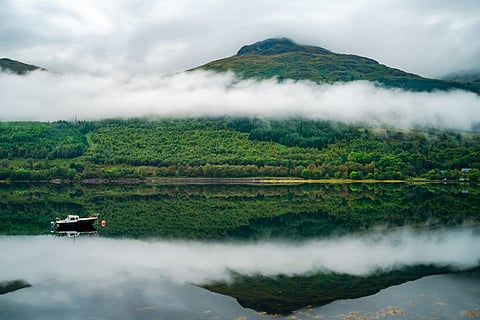

Although the National Park Authority Board will make a final decision on the project on the 31st, the recommendation from Loch Lomond & the Trossachs National Park officials to members is that they refuse the application for Scotland's first semi-closed containment technology salmon farm. Meanwhile, the company behind the project, Loch Long Salmon (LLS), claims that this approach goes against one of the key objectives of the Park's own Partnership Plan to "address national priorities and achieve benefits for Scotland beyond the National Park boundaries".
"The Scottish Government and the National Park have both said this project is of national significance", claims Stewart Hawthorn, Managing Director of Loch Long Salmon. "It has the support of bodies such as SEPA, Forestry & Land Scotland and NatureScot; the local MP; a cross-party grouping of MSPs and Councillors; the host community council; and a range of local people and groups", he adds.
Despite these political endorsements, the granting of permission for Beinn Reithe's Loch Long project hangs in the balance, as the National Park officers have raised both landscape and technological objections, as well as those relating to the loss of woodland, in their argumentation for its refusal. "The development would not be in alignment with National Marine Plan Aquaculture Policy 5 that aquaculture developments should avoid and/or mitigate adverse impacts on the seascape, landscape and visual amenity of an area and Objective 2 for Wild Salmon and Diadromous Fish to maintain healthy salmon and diadromous fish stocks", says the recommendation. Moreover, it adds that the information provided is insufficient to meet the requirements of the Scottish Government Control of Woodland Removal Policy.
Stewart Hawthorn disagrees. "Loch Long is the ideal location for our demonstration site. We are confident Board Members will see the benefits of this game-changing project, furthering the National Park's goals by promoting sustainable business growth, creating jobs and supporting communities", he says. According to the project, the salmon farm would generate employment opportunities equivalent to 12 full-time employees and an average of 20 people with a maximum of 40 temporary jobs during the construction process that would take into account local contractors and suppliers. But the officers' recommendation also calls this into question. "There would, however, be no guarantee that roles at the proposed farm would be filled by local people and due to the specialist nature of the equipment required it may not be possible to use local suppliers", they say.
As said, the Loch Long Salmon farm in Beinn Reithe would be the first semi-closed containment technology salmon farm in Scotland. "This transformative technology could have a positive environmental impact across Scotland by leading positive change in salmon farming, a critical food production sector and a vital part of our rural economy", says its Managing Director, Stewart Hawthorn.
"The technology has been proven for decades and has operated without any fish escapes over hundreds of production cycles. It removes the threat of sea lice and the need for treatment, protecting the seabed, and will never require acoustic devices to deter seals", he adds. According to the LLS release, even the Atlantic Salmon Trust, an organization for the protection of wild salmon and sea trout, has recognized that this technology has been used successfully in other countries. Nevertheless, National Park officers do not feel the same way. "The technology proposed has not been trialed in Scotland and there are inherent risks from an escape incident to wild salmon populations which are already fragile", they argue.
The officials' final advice is: "The National Park Authority must, in its determination of the application, give greater weight to the first aim 'to conserve and enhance the natural and cultural heritage of the area' as it is in conflict with the fourth aim". We will have to wait until October 31 to know what the final decision will be.
